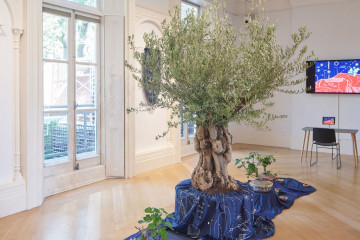

The first thing you notice when you walk into the In the shade of the sun exhibition is an olive tree, wide, centre in the middle of the room, among younger olive trees, almost ready to bear fruit. Behind the tree, on the walls, across a banner are the words, in glitter, no less, “FROM THE RIVER TO THE SEA”.
Since the Palestinian Nakba of 1948, in which approximately 700,000 Palestinian Arabs were evacuated and uprooted from their homes, without any access to return, Palestinian symbolism has become easy to recognise.
Everything from the popular chant “From the river to the sea, Palestine will be free” to holding watermelons (as historically Palestinians were not allowed to wear their flag so opted for the fruit) to the mighty olive tree have become signs for the fight for freedom.
"In the shade of the sun is an exhibition with roots that have been felt for decades and are still relevant to humanity and mother nature"
Multi-disciplinary artist Xaytun Ennasr shifts between mediums such as film, installation, music and gaming for the In the shade of the sun exhibition.
A touch-screen allows you to chop down Palestinian olive trees only to show the different ways in which they can and will grow back.
Ennasr has also created paintings and artworks of olive trees that appear almost dystopian but perhaps magical in the way Palestine has always been described.
Underneath the paintings, there are poetic forces of nature with quotes stating: “Love is a galaxy in which all suns orbit, for each revolutionary, is a lover” and “Revolution is a tree under which the whole village gathers and declares love” — soft reminders of Palestinian resistance to humanitarian rights to freedom.
|
|
It wasn’t until I experienced Ennasr’s paintings and walked into Dina Mimi’s project The Melancholy of this Useless Afternoon that I connected the Palestinian resistance for freedom and environmental issues together.
The Melancholy of this Useless Afternoon is a film on bird smuggling, with two chapters sharing the role of the fugitive and the smuggler.
The ways in which birds are hidden under shoes and under a vest, that which is framed alongside the film, felt respondent to two things that happen synonymously.
What Palestinian civilians must feel and do in order to live ordinary lives — being both the birds trying to escape from the tiny, hidden places they are stuffed in that have now become ‘normal’ and home and the smuggler navigating ways to still experience a hobby on this useless afternoon.
|
|
It is not often that we correlate the role of colonialism and imperialism in Palestine and the consequences this has on the planet.
The truth is native people don’t tend to burn down trees their ancestors planted. What harm must come to the planet for people and animals to live inhumanely in the Earth’s most densely populated area?
"You cannot evacuate and banish millions of people without having an effect on the planet"
As Israel has currently called for over a million people living in the Gaza Strip to relocate, in what appears to be a second Nakba, In the shade of the sun exhibition is a reminder of how connected we all are and how these two issues that we do not conflate together are the ones that are in fact bound together. You cannot evacuate and banish millions of people without having an effect on the planet.
A common phrase we hear about Israel and Palestine is that it is a ‘complex’ issue when in fact, it is not. In Mona Benyamin’s Tomorrow Again, a short film I watched four times consecutively, Benyamin directs a dysfunctional broadcast in which two sides of the same event are told opposingly.
The actors involved, who are Benyamin’s parents, each play Israeli and Palestinian characters with daily catastrophes ensuing in the background: it is purposefully confusing and shows the power of propaganda.
Questioning what is a truthful testimony and whose word is allowed to be believed? Tomorrow Again is played on a loop, an echo of what those living in Palestine have had to endure for the last 75 years.
In the shade of the sun is an exhibition with roots that have been felt for decades and are still relevant to humanity and mother nature.
It is an expression of the stories and art which happen even while being oppressed. A reminder that as long as Palestinians and good prevails, one day Palestine will be free but right now, these are the stories we pay attention to and the art we internalise and vocalise.
It is as artist Xaytun Ennasr wrote, “All revolutionaries are lovers”.
In the shade of the sun will run between 6 September – 14 January 2024 at the Mosaic Rooms and entry is free.
Tahmina Begum is a freelance journalist and editor
Follow her on Twitter @tahminaxbegum




 Follow the Middle East's top stories in English at The New Arab on Google News
Follow the Middle East's top stories in English at The New Arab on Google News


